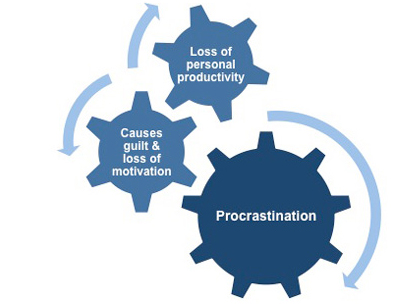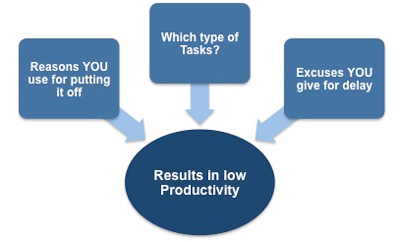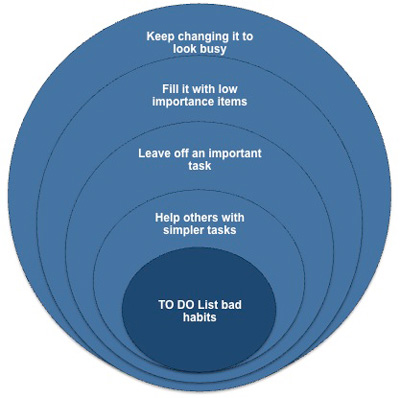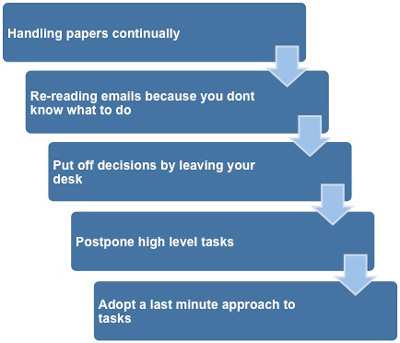Stop Procrastinating
Most people at some time or another will have found themselves putting off starting a task, even though they feel uncomfortable about doing so. This is known as procrastination, which can be defined as:
'The act of replacing high-priority actions with tasks of lower priority, or doing something from which one derives enjoyment, and thus putting off important tasks to a later time.'
Or
'To voluntarily delay an intended course of action despite expecting to be worse off for the delay.'
This putting off of important tasks results in a sense of guilt that causes a loss of motivation and personal productivity. It can also lead to stress as a result of disapproval for not meeting commitments.
 |
Almost everyone is guilty of procrastination occasionally. High-priority tasks are usually difficult or time-consuming and it is often easier to find simpler, less important tasks to do instead. Sometimes delaying a high-priority task is completely justified because you don't have all of the information that you need or you feel that the task may be given a lower priority as circumstances change.
If you feel uncomfortable justifying to yourself why you are not getting on with a particular task then you need to accept that you are probably guilty of procrastination. Our Overcoming Procrastination eBook is designed to help you understand the problem better and learn some successful ways of dealing with it.
Even if you don't suffer from this problem yourself, it is possible that someone in your team does and you may be able to help him or her to overcome it.
If you want to improve your personal productivity, you will need to identify the types of job you put off and the reasons and excuses you give yourself.
 |
Many people admit to putting off jobs because: they find the job daunting or unpleasant, or they hope that the job will somehow go away, or they just don't know where to start. They may justify this by finding routine tasks to do instead. Alternatively, they may wait until the pressure is really on before starting to take appropriate action.
Putting off jobs we dislike doing is a common trait. Unfortunately, most jobs that are put off don't go away - they remain waiting to be done, and they tend to stay at the back of our minds, often causing feelings of guilt and acting as a distraction.
 |
Another disadvantage of this type of behavior is that it tends to lead to an ever-increasing number of jobs that remain outstanding. This growing list becomes ever more daunting and it then becomes more and more difficult to make a start on any of them.
If you find yourself using your 'To Do' list in the following ways you are delaying tasks and causing yourself unnecessary guilt and stress by doing so. You can also assess how much you procrastinate when making decisions by looking at how many of the common behaviors you exhibit.
- Repeatedly handling papers rather than deal with it first time.
- Keep on re-reading emails to put of deciding if you should delete / file / respond.
- Distract yourself by leaving your desk rather than start on high-level task.
- Postpone working on high-level task until you 'Feel like it!'
- Start work on high-level task at last minute because you work better under pressure.
The acid test is how your morale, motivation, and personal productivity are affected by putting off a particular task. If you are feeling guilty or embarrassed about your behavior then you need to understand why you are procrastinating as a first step to overcoming this tendency.
If you keep a record of how you spend your day, you can now look back at it and see if you can identify any tasks that you normally have difficulty starting or sticking at. Once you recognize the types of task that cause you to procrastinate, you can try to manage and eliminate this behavior.
One thing that you will need to guard against is the tendency to justify procrastination on the basis that you're just putting a job off until you're 'in the right mood' to do it. Your ability to be successful at any task is not dependent upon your mood. There are occasions when you will have to do something you don't like, even if you don't feel like it - it is just essential that the task is completed. That doesn't mean your results are going to be of a lesser quality, or that the task will be a failure. It just means that in this instance your motivation comes after you've started work on something.
 |
Sometimes, working on a project helps bring about a change in our mood. We can't always expect to be in the right mood all the time. Neither should you expect to be able to work on things in life only when you're in the right mood. These are just elaborate excuses we make up to reinforce our procrastinating behavior.
Psychologists believe that the tendency to put off certain types of activity even when we know it is not in our long-term interests has its roots in behavioral evolution. The theory is that early humans gained more benefit by saving the energy needed to implement long-term plans in favor of saving it for dealing with immediate problems. In other words:
Taking time to think about longer-term plans could be a distraction from short-term survival.
This makes it difficult for abstract motivations to overcome avoidance of tasks that do not give us short-term pleasure. Whilst this hypothesis cannot be proven, it is tempting to believe that the tendency to procrastinate must have some fundamental reason for being so powerful and widespread.
Even if this behavior does have its roots in evolution, it has certainly outlived its usefulness in the modern workplace. As a manager you will have many important tasks that you need to complete. There may be no short-term payoff for you, but their importance as part of the overall success of your organization makes them essential to complete. The issue for you is how to avoid falling into the numerous ways and behaviors we can adopt to 'put off' performing such tasks.
You may also be interested in:
Symptoms of Procrastination | Why People Procrastinate | Dealing with Boring or Pointless Tasks | Dealing With Tasks Involving Confrontation | Tasks You Resent Being Given | Tasks That Appear Overwhelming | Tasks You Don't Know How to Begin | Tasks You Are Afraid of Completing | Lack of Motivation.



